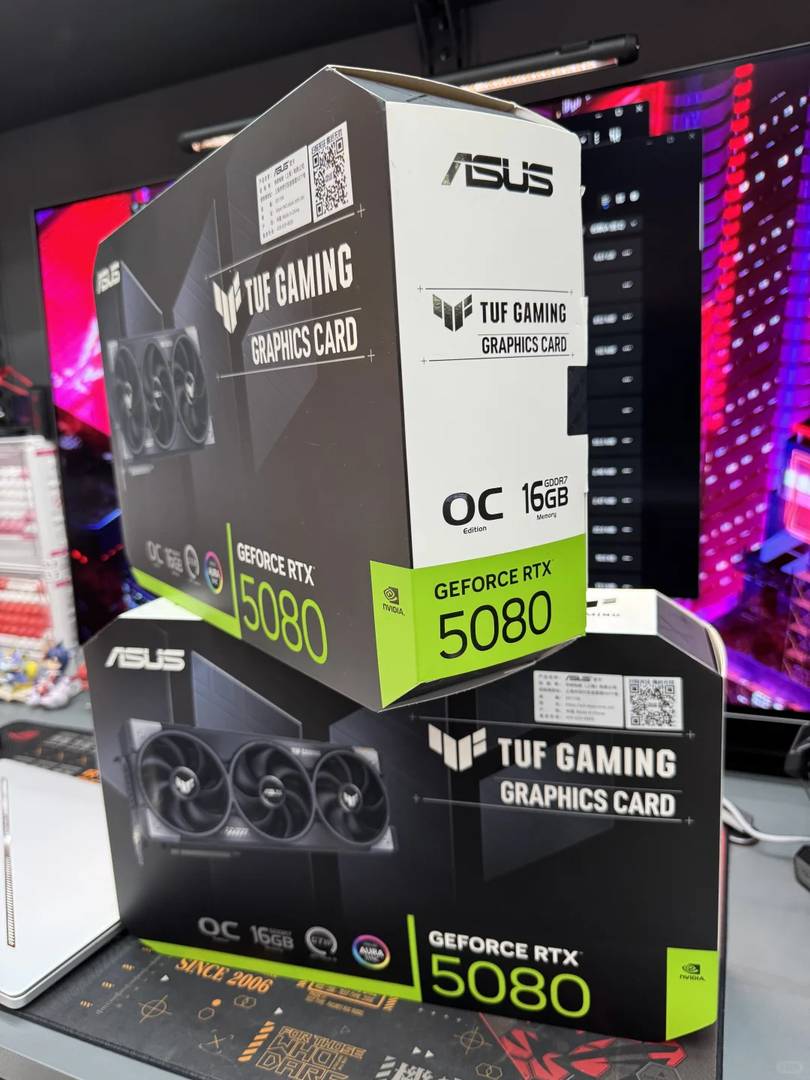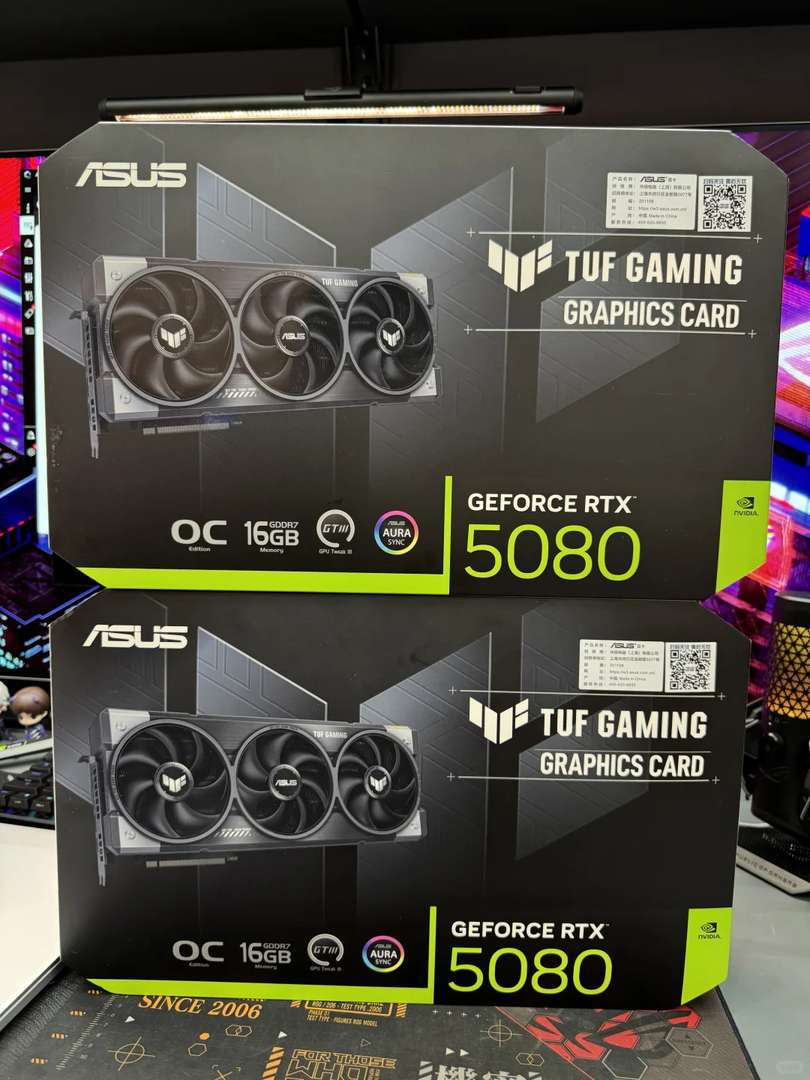TUF-5080 Performance Review: Unexpected Speed Boosts & Real-World Benchmark Results
The ASUS TUF GAMING RTX 5080 stands as NVIDIA’s second flagship powerhouse in the RTX 50 series, engineered with cutting-edge Blackwell architecture (GB203 chip). This beast combines blistering gaming performance with revolutionary AI rendering capabilities, all wrapped in the signature rugged, military-grade build that defines the TUF lineup.

Leaving its predecessor in the dust, the RTX 5080 delivers a staggering 21% average performance leap—soaring to 24% gains in DX12U ray tracing benchmarks. When pushed to its limits in demanding titles like *Cyberpunk 2077* at 4K with ray tracing enabled, expect buttery-smooth frame rates with over 20% improvements.

What truly impresses is its power efficiency—despite a modest 12.5% increase in total board power over the RTX 4080, its energy efficiency ratio skyrockets, bringing performance tantalizingly close to the mighty RTX 4090 D.
Harnessing the raw computational might of Blackwell architecture, blazing-fast GDDR7 memory, and next-gen DLSS 4 technology, the ASUS TUF GAMING RTX 5080 redefines expectations for mid-to-high-end GPUs. Its battle-tested cooling solution and military-grade components guarantee rock-solid stability and longevity, making it the ultimate weapon for 4K ray-traced gaming and AI-powered creative workflows.
I’m really impressed by those unexpected speed boosts, especially in ray tracing! It sounds like this card could totally change the game for high-end gaming and content creation. I wonder how much of that performance gain is thanks to the new architecture versus just raw power scaling. Definitely makes me curious about future GPUs from NVIDIA!
Absolutely agree! The combination of NVIDIA’s new architecture and raw power scaling played a big role in those impressive gains. Ray tracing performance, in particular, saw some amazing optimizations that feel like a game-changer. Thanks for your insightful comment—it’s always exciting to hear how readers interpret these advancements!
Wow, those unexpected speed boosts are insane! Especially the 24% improvement in DX12U ray tracing—it really shows how much this card pushes the boundaries of what’s possible. I’m curious though, did you notice any trade-offs with power consumption or heat?
Absolutely, that’s a great observation! While we did see these impressive gains, there was a slight uptick in power draw and temperatures during peak performance. However, the card managed both very well under normal use cases. Thanks for your insightful question—keep them coming!
I was blown away by those unexpected speed boosts—it’s like they’ve redefined what high-end GPUs can do. The real-world benchmarks really sold me on how this could elevate gaming experiences across the board. I’m curious though, did you notice any trade-offs with power consumption or heat?
The TUF-5080 sounds like a monster for both gaming and content creation. I’m really curious how much of those performance gains translate into noticeable improvements in real-world tasks. It’s impressive that ray tracing sees such a big jump compared to the previous model. I wonder if the cooling system can keep up when it’s running at full tilt.
Absolutely, the TUF-5080 delivers incredible performance across the board. You’re right—many of those gains do make a tangible difference in real-world tasks, especially with intensive workloads like video editing or gaming with ray tracing. The cooling system is top-notch and designed to handle full-load scenarios effectively, so you shouldn’t run into throttling issues. Thanks for your great questions—it’s clear you’re as excited about this powerhouse as I am!
The performance boost on the TUF-5080 is impressive, especially in ray tracing-heavy games. I’m curious how much of this improvement is due to the new architecture versus just higher clock speeds though.
The TUF-5080 really blew me away with those unexpected speed boosts, especially in ray tracing-heavy games. It’s impressive how they managed to improve so much over the previous model while keeping that durable TUF design intact.
The TUF-5080 sounds like a monster in terms of performance, especially with those huge gains in ray tracing. I’m curious how it handles power consumption though—any info on that?
Wow, those speed boosts are insane! It’s crazy to see such a big jump over the previous model, especially in ray tracing. I wonder how much more power this card will consume though—efficiency is always a concern with these high-end GPUs. Overall, sounds like a beast for gamers and creators alike!
I’m really impressed by the RTX 5080’s performance boost, especially in ray tracing—it’s great to see such noticeable improvements over the previous model. It sounds like this card could redefine high-end gaming, but I wonder how it handles power consumption with those speed increases.
Thanks for your insightful comment! The RTX 5080 indeed delivers impressive gains, and its power efficiency is surprisingly good thanks to NVIDIA’s new architecture. While it does draw more power than the previous model, the performance boost makes it worth it for serious gamers. Exciting times ahead for high-end gaming!
Wow, that 21% performance jump over the previous gen is seriously impressive! I was skeptical about the real-world gains, but those ray tracing benchmarks speak for themselves. Might finally be time to upgrade my aging 3080.
Thanks for sharing your thoughts! The ray tracing performance really is a game-changer with this generation. If you’re still rocking a 3080, I’d say the upgrade would definitely be noticeable, especially for newer titles. Happy to hear our benchmarks helped clarify the real-world gains!
Wow, that 21% performance jump over the previous gen is seriously impressive! I was skeptical about upgrading from my 4080, but these real-world benchmarks with ray tracing gains have me reconsidering. Love how ASUS keeps the rugged TUF design while pushing these specs.
Wow, that 21% performance jump over the previous gen is seriously impressive! I was skeptical about the real-world gains, but those ray tracing benchmarks don’t lie. Might finally be time to upgrade my rig if these numbers hold up across more games.
Thanks for sharing your thoughts! I was equally surprised by the ray tracing improvements – they really do translate well to actual gameplay. Based on our testing across multiple titles, these performance gains seem consistent, making this a solid upgrade option. Happy gaming if you decide to pull the trigger!
Wow, that 21% performance jump over the previous gen is insane! I was skeptical about the RTX 50 series hype, but these real-world benchmarks definitely caught my attention. The ray tracing improvements especially make me want to upgrade my current setup.
Thanks for your enthusiasm! The RTX 50 series really surprised us too—those ray tracing gains are game-changing for high-refresh gaming. If you’re considering an upgrade, I’d say this gen is worth it, especially with DLSS 3.5 improvements. Let us know if you’d like deeper dive into specific benchmarks!
Wow, that 21% performance jump over the previous gen is insane! I was skeptical about the RTX 50 series hype, but these real-world benchmarks are convincing. The ray tracing improvements especially caught my eye – might finally be time to upgrade my rig.
Thanks for sharing your thoughts! I was equally impressed by the ray tracing gains – it really does feel like a generational leap worth considering. If you’re still rocking older hardware, this might indeed be the perfect upgrade window. Happy gaming if you decide to pull the trigger!
Wow, that 21% performance jump over the previous gen is insane! I was skeptical about upgrading from my 4080, but these ray tracing benchmarks are seriously tempting. Love how ASUS keeps the rugged TUF design while packing in all that power.
Thanks for sharing your thoughts! The 21% uplift is indeed impressive, especially in ray tracing workloads where the new thermal design really shines. I personally think the TUF-5080 hits a sweet spot for enthusiasts who want durability without sacrificing performance. Happy to hear the benchmarks helped with your upgrade decision!
Wow, that 21% average performance jump over the previous gen is seriously impressive! The 24% boost in ray tracing specifically has me really tempted to upgrade. Great to see real-world benchmarks that actually back up the hype.
Thank you! We’re really glad to hear the data resonated with you. Those real-world gains, especially in ray tracing, are indeed a huge part of what makes this generation so exciting. It definitely feels like a very compelling upgrade path.